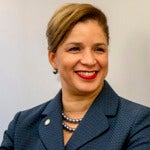Benefits21 Financial Resilience Series Part 1: Modernizing Public Benefits to Support Financial Resilience
Aspen FSP’s Financial Resilience Series will highlight the foundational role benefits play in supporting household financial resilience, elevate the insights and work of benefit leaders, and discuss the opportunities for scale and innovations needed in public benefits and workplace benefits.
Part 1: Modernizing Public Benefits to Support Financial Resilience. This event highlights a new framework for financial resilience, elevates the work of federal, state, and nonprofit leaders currently paving the way to support household financial resilience by taking a people-centric approach to redesign public benefits, and explores opportunities for scaling these solutions to reach all households.
Speakers

Sarika Abbi, Associate Director, Aspen Institute Financial Security Program
Sarika is an Associate Director for the Aspen Institute’s Financial Security Program. She leads our Benefits21 work to modernize the design and delivery of benefits to ensure the financial security and economic dignity of all workers. She has spent nearly 15 years in financial inclusion and financial security work, both internationally and domestically, with expertise in program management, product design, research and evaluation. Prior to joining Aspen FSP, she was the Assistant Director of the San Francisco Office of Financial Empowerment, directing its Economic Mobility Lab to test and scale innovations that strengthen the economic security and mobility of low income San Franciscans. She developed and managed strategic partnerships with City departments to design and embed financial solutions into their work, including innovative ways to reimagine benefits so workers and their families can achieve stability and long-term financial security. She also worked at Commonwealth (formerly D2D Fund) to design, pilot and evaluate financial innovations, helping lead a new area of work on emergency savings. Prior to that she worked at ideas42 and collaborated with financial institutions, funders and academics to design, pilot and evaluate financial innovations internationally.
Sarika earned her Master of Arts in Public Administration from New York University and Bachelor of Arts in Economics from the University of California, Berkeley.

Amanda Renteria, CEO, Code for America
Amanda is the CEO of Code for America, an organization that helped launch the civic tech ecosystem in the United States. Today, Code for America partners with governments and community-based organizations leveraging technology to create equitable government systems focused on programs that strengthen the social safety net, increase access to tax benefits, automate record clearance, and foster an active civic tech volunteer network across the country. In September 2020, they launched a mobile-first tax credit portal in English and Spanish in partnership with the White House and Treasury. In April of 2021, they were awarded a philanthropic investment of $100 million to improve state social safety net systems over the next several years. In addition to leading Code for America, Amanda is a paid contributor to the BBC and ABC News on policy and political matters in the United States.
Before Code for America, Amanda served as the Chief of Operations for the largest Justice Department in the country, overseeing 1,000 public servants and an $850 million budget, the National Political Director during the 2016 United States Presidential Campaign for Secretary Clinton, and a Chief of Staff in the United States Senate where she worked for nearly a decade, becoming the first Latina Chief of Staff in the history of the U.S. Senate.
Amanda grew up in a small, agricultural town in the Central Valley of California and is the proud daughter of former farmworkers and an immigrant father. She serves on several non-profit boards and holds degrees from Stanford University and Harvard Business School.
 Terri Ricks, Deputy Secretary, Louisiana Department of Children and Family Services
Terri Ricks, Deputy Secretary, Louisiana Department of Children and Family Services
Terri Ricks brings over two decades of legal, financial, human resources, policy and management experience to her role as Deputy Secretary of the Department of Children and Family Services. An accomplished legal and administrative executive with a proven ability to lead and manage complex organizations, Ricks previously served as Undersecretary of the Department of Social Services (“DSS” and now “Department of Children and Family Services”), from 2004 to 2008.
As DCFS Deputy Secretary, Ms. Ricks plays an essential role in the leadership and management of DCFS and has been responsible for enterprise-wide efforts since 2016.
Those efforts include leading the restructuring of DCFS in 2016 and fundamentally reframing the Family Support Division to include a greater emphasis on workforce initiatives, a shift to more family-centered child support, increased client access through more robust customer service, and increased poverty competency of staff. Ms. Ricks represents DCFS on the Governor’s Workforce and Education Subcabinet, a cross-agency collaborative effort primarily focused on harnessing Louisiana’s untapped talent. She also led the efforts to create the department’s Diversity, Equity and Inclusion (DEI) unit. Responsive to Louisiana’s needs, she has increased partnerships with community organizations, national foundations, and others to decrease poverty and increase equity and family stability.
Among her numerous responsibilities, she serves as the department’s executive leader regarding disaster recovery matters, helping shape Louisiana’s disaster recovery in the area of health and social services and gathering the attention and support of federal partners for recovery.
Ms. Ricks has been a key force in expanding the department’s use of technology to communicate both internally and externally, sharing information with staff and stakeholders about services and department actions, particularly in times of disaster. Working with nonprofit Code for America, she led the department’s efforts to use technology to combat the loss of benefits when clients are still eligible. She also was an early champion of the department’s adoption and implementation of a mass mobile alert communication system and played a major role in DCFS’s partnership with Louisiana 2-1-1 to provide up-to-the-minute information to the public during emergency events. She now builds upon that partnership in leading the department in its No Wrong Door service delivery, introducing the use of the 2-1-1 resource and referrals, including a closed-loop referral platform powered by Unite Us, to better serve Louisiana.
Her work positioned DCFS to respond deftly to the COVID-19 pandemic, during which Ms. Ricks has managed the department’s internal response, including policy changes, communication with leadership, and the development of an online COVID reporting system for staff.
Currently pursuing a Ph.D. for Leadership and Human Resource Development at LSU, Ms. Ricks previously served as Director of Human Resources and attorney at Baton Rouge Community College, as well as the General Counsel of the Louisiana Housing Corporation before returning to DCFS as Deputy Secretary.
Ms. Ricks began her public service career as an eligibility determinations examiner at DSS. Her first legal position in public service was as Assistant Attorney General at the Louisiana Department of Justice in public finance. She has extensive legal and policy experience with family-related matters, housing and government administration, contracts, labor-related matters and mediation.
A member of the Louisiana State Bar Association, Ricks received her Juris Doctorate from Tulane University Law School where she served as President of the Student Bar Association. She earned her undergraduate degree in psychology from Louisiana State University.
Ms. Ricks earned her Diversity, Equity and Inclusion in the Workplace Certificate from the University of South Florida MUMA College of Business in 2021, and she was chosen to participate in the first Louisiana Public Health Institute Racial Justice & Health Equity in Louisiana Learning Lab in 2020 and the 2019 Health and Human Services Summit at Harvard University.
Ms. Ricks is a 2010 alumna of the Council for a Better Louisiana (CABL) Leadership Louisiana program, an Inaugural Fellow of the 2009 Louisiana Effective Leadership Program (LaELP) of Duke University’s Sanford School of Public Policy’s United States-Southern African Center for Leadership and Public Values & Southern University College of Business’ Center for Entrepreneurial and Leadership Development. Ms. Ricks is a past member of the LSBA Alternative Dispute Resolution Section Council.
 Joanna Smith-Ramani, Managing Director, Aspen Institute Financial Security Program
Joanna Smith-Ramani, Managing Director, Aspen Institute Financial Security Program
Joanna Smith-Ramani is Managing Director of the Aspen Institute Financial Security Program, a leading national voice on Americans’ financial health. She is responsible for conceptualizing, planning, and overseeing the program’s research, convenings, and programs, aimed at furthering FSP’s mission to illuminate and solve the most critical financial challenges facing American households and to make financial security for all a top national priority. Joanna has more than 15 years of experience across community, personal finance, and asset development. Joanna holds a Master of Public Policy degree from the Harvard Kennedy School and a B.A. in Urban Studies from Barnard College, Columbia University. She serves on the Boards of the CASH Campaign of Maryland, A Wider Circle, and the Lilabean Foundation, and was selected to the 2017-2018 class of Leadership Montgomery.
 Tim Shaw, Associate Director of Policy, Aspen Institute Financial Security Program
Tim Shaw, Associate Director of Policy, Aspen Institute Financial Security Program
As the Associate Director of Policy for the Financial Security Program, Tim works to advance promising policies that address the most pressing financial security challenges facing people in America. Working with leaders across levels of government, Tim and Aspen FSP’s policy team seek to provide policymakers the innovative ideas, research, and network of leaders they need to design and enact policies that make a concrete difference in people’s financial security.
Before joining the Aspen Institute, he was an Associate Director for Economic Policy at the Bipartisan Policy Center. While there, he was the policy lead for BPC’s Paid Family Leave Task Force and led projects on economic opportunity, retirement security, and fiscal policy. Prior to that work, he was a tax and budget staffer at the Government Accountability Office. His work has been featured in numerous publications, including the Washington Post, Politico, and the Wall Street Journal.
Tim holds a B.A. in Political Science and Spanish from Washington University in St. Louis and a master’s degree in Public Policy and Management from Carnegie Mellon University.

Gene Sperling, White House American Rescue Plan Coordinator and Senior Advisor to the President
Gene Sperling is the White House American Rescue Plan Coordinator and a Senior Advisor to the President. Previously, Sperling served as Director of the National Economic Council and National Economic Advisor to both President Obama (2011-2014) and President Clinton (1997-2001). Under Presidents Clinton and Obama, he played a lead role in the significant expansion of the Earned Income Tax Credit (EITC) and other refundable tax relief for hard-pressed families. He was a key architect of the 1993 Economic Plan during the Clinton administration and a key negotiator in the 1997 Balanced Budget Agreement that led to the Children’s Health Initiative Program (CHIP), higher education tax relief and played leadership roles in the creation of the New Markets Tax Credit, Community Development Financial Institutions, Gear-Up, Debt Relief for low-income nations, and anti-sweatshop and anti-child labor initiatives. Under President Obama, Sperling played a critical role in passage of the payroll-tax cut and the Small Business Jobs Act (including the State Small Business Credit Initiative), the proposed American Jobs Act, the Manufacturing Hubs Initiative, as well as in special initiatives on college opportunity and efforts to help long-term unemployed.
Sperling is the author of Pro-Growth Progressive (2005) and Economic Dignity (2020). He is the founder and first Executive Director (2002-2008) of the Center for Universal Education at Brookings Institution, a center that focuses on education for girls and boys in developing nations.
 Dr. Clarence Wardell III, Chief Data and Equity Officer, White House American Rescue Plan Team; Senior Advisor for Policy Implementation and Delivery, Domestic Policy Council
Dr. Clarence Wardell III, Chief Data and Equity Officer, White House American Rescue Plan Team; Senior Advisor for Policy Implementation and Delivery, Domestic Policy Council
Dr. Clarence Wardell III is the Chief Data and Equity Officer with the White House American Rescue Plan Team, and a Senior Advisor for Policy Implementation and Delivery with the Domestic Policy Council. Clarence most recently served on the Biden-Harris Transition leading tech strategy & delivery across the domestic and economic policy team, and prior to working on transition, he was the Vice President of Solutions at Results for America where he supported Bloomberg Philanthropies’ What Works Cities Initiative along with other local, state, and federal efforts to scale evidenced-based solutions to address a wide range of challenges. Clarence was previously a Presidential Innovation Fellow and member of the U.S. Digital Service during the Obama Administration where he co-led the White House Police Data Initiative. He holds a BSE in Computer Engineering from the University of Michigan and a PhD from the Georgia Institute of Technology’s School of Industrial and Systems Engineering.
 Michael Wilkening, Senior Advisor for Delivery, Executive Office of the President
Michael Wilkening, Senior Advisor for Delivery, Executive Office of the President
Michael Wilkening serves as Senior Advisor for Delivery at the Executive Office of the President and co-lead of the Facing Financial Shock project. Prior to joining the federal government, Wilkening was California’s first Special Advisor on Innovation and Digital Services. Working directly with the highest ranking officials in California government, Wilkening chaired the Innovation & Technology Task Force, to connect the public and private sectors, designing and utilizing innovative approaches to shape California’s response to the COVID-19 pandemic. He previously served as Secretary of the California Health and Human Services Agency (CHHS) and as Chair of Covered California. Prior to his appointment as Secretary, Wilkening was Undersecretary of CHHS for nearly a decade. He holds a Master of Arts degree in political science from the University of California, Davis.